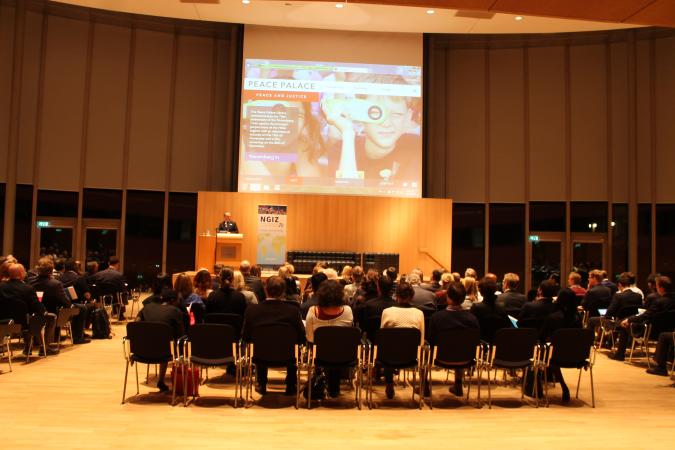On Thursday November 5th the Peace Palace Library, in cooperation with the Netherlands Society of International Affairs / Club Clingendael, organized ‘Trade Talks’. About 120 people attended the evening, hearing lectures and participating in discussions on international trade and the present negotiations of the Transatlantic Trade and Investment Partnership (TTIP) agreement between the European Union (EU) and the United States of America (USA).
The keynote speech was delivered by the director International Markets and Trade Policy at the Dutch Ministry of Foreign Affairs, Ronald Roosdorp. He elaborated on the substance of the TTIP agreement and he debunked the myths currently woven about the TTIP agreement in the public debate.
After this introduction in the topic of international trade the attendants could choose two rounds of expert sessions interrupted by an authentic Dutch meal.
Masterclass
In his masterclass, Mr. Trojan, an influential former Dutch civil servant in Brussels and nowadays a member of the Advisory Council on International Affairs (AIV) spoke about the ‘Investor to State Dispute Settlement’ (or ‘ISDS’ part) of the TTIP agreement. Dispute settlement between investors and states through international arbitration (ISDS) gives the investors the opportunity to invoke these agreements directly. After leading an inconspicuous existence for many years ISDS has evolved rapidly in recent decades. ISDS has functioned well in various ways.
Nonetheless, the present ISDS system has given rise to concern and justified criticism.The negotiations about TTIP have fueled public debate in the Netherlands and elsewhere. Part of the criticism is addressed to TTIP as such but most of the concerns are aimed at ISDS in particular. The main issues are the right of states to regulate and the question whether the conditions of ISDS meet the rule-of- law requirements. ISDS proceedings may make states reluctant to regulate out of fear of receiving large damage claims from investors (regulatory chill). As to the rule-of-law there are concerns on the consistency of arbitral awards, the independence and impartiality of arbitrators, and the lack of transparency of international arbitration. Moreover there is the fear that the American claim culture will cross the Atlantic. The central question is finding a balance between the interests of free trade and investment and the regulatory rights of states. What is at stake is the right to regulate public goods such as the protection of the environment and climate, as well as that of consumers, thus safeguarding public health and welfare.
In its report of April 2015 the AIV favors the inclusion of some form of ISDS in TTIP. It is doubtful whether national judges in the US and in several EU member states can or will provide sufficient protection to foreign investors. Preferential treatment of domestic investors is not forbidden by US law. Moreover international treaty provisions have no direct effect in the US. In the case of the Netherlands such direct effect is clearly recognized. For the longer term, mr Trojan told the participants, the AIV favors an International Investment Court with permanent judges. In first instance such a court should be established within TTIP. Obviously it can only deal with disputes between the US and the EU and its member states.
In another masterclass Jobien Hekking of the Centre for the Promotion of Imports from developing countries (CBI) part of the Dutch Ministry of Foreign Affairs, provided data of nearly all developing countries in order to promote mutual international trade. These data sparked an interesting debate between mrs Hekking and the present representatives of private investors, the Netherlands African Business Council, and international banks.
Moreover, Arthur Neeteson of the Port of Rotterdam explained how the changing international trade environment poses chances and difficulties for the biggest port in Europe. In his masterclass he talked about security issues as well as changing demands in international shipping. For example, the current drop in growth rate in China directly affects the shipping of commodities around the globe, and consequently to the port of Rotterdam.
Dirk Pulkowski, senior legal counsel of the Permanent Court of Arbitration, elaborated on the role of international arbitration and the workings of this organization, also located inside the Peace Palace. Furthermore, its potential role in the TTIP agreement was discussed.
All in all, the masterclasses provided the participants with lots of information about international trade. Much of this knowledge was shared as well as discussed during the closing drinks after the second round of masterclasses. After a short speech of Armand van de Laar, vice-chair of the Netherlands Society of International Affairs, the evening came to an end.
Conclusion
‘Trade Talks’ provided all participants with views from a lot of different angles, ranging from an international law perspective to a more economical view, about the problems and benefits of the Transatlantic Trade and Investment Partnership. We thank the Netherlands Society of International Affairs for making this debate possible and we hope it will prove to be a fruitful base for further, upcoming, TTIP debates.
- Fahey, E. and D. Curtin, A Transatlantic Community of Law: Legal Perspectives on the Relationship between the EU and US Legal Orders, Cambridge, Cambridge University Press, 2014.
- Weaver, M., "The Proposed Transatlantic Trade and Investment Partnership (TTIP): ISDS Provisions, Reconciliation, and Future Trade Implications", Emory International Law Review, 29 (2014), No. 1, pp. 225-275.
